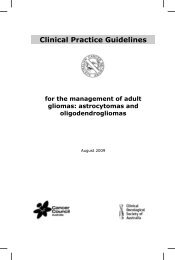Clinical Practice Guidelines for the management of locally advanced ...
Clinical Practice Guidelines for the management of locally advanced ...
Clinical Practice Guidelines for the management of locally advanced ...
Create successful ePaper yourself
Turn your PDF publications into a flip-book with our unique Google optimized e-Paper software.
Recommendation<br />
Toxicities in <strong>the</strong> context <strong>of</strong> what is important to each individual patient should be considered,<br />
as decrements in highly valued faculties <strong>for</strong> some patients may have a significant impact on<br />
<strong>the</strong> quality <strong>of</strong> life and overall adjustment <strong>of</strong> those individuals and those close to <strong>the</strong>m.<br />
Grade C<br />
5.1.6 Intermittent or continuous androgen deprivation <strong>the</strong>rapy<br />
As stated previously, ADT is associated with a number <strong>of</strong> toxicities that are quality-<strong>of</strong>-life impairing<br />
and/or clinically significant and are related to prolonged exposure to castrate level <strong>of</strong> testosterone.<br />
This is particularly relevant <strong>for</strong> patients who have a good initial response to <strong>the</strong>rapy that portends <strong>the</strong><br />
potential <strong>for</strong> long-term benefit from ADT. A strategy to potentially ameliorate <strong>the</strong> toxicity is to use<br />
ADT intermittently (ie withhold when in remission and restart when regrowth occurs). It is also<br />
contended, based on preclinical models, that <strong>the</strong> cyclical exposure to ADT and testosterone will<br />
prolong <strong>the</strong> sensitivity to ADT and hence increase <strong>the</strong> efficacy <strong>of</strong> ADT. At <strong>the</strong> time <strong>of</strong> writing, <strong>the</strong><br />
volume <strong>of</strong> evidence was limited by:<br />
lack <strong>of</strong> data from reported large well-powered randomised studies, that is, <strong>the</strong> definitive<br />
studies are yet to be reported and only smaller studies have been reported<br />
inclusion <strong>of</strong> <strong>locally</strong> <strong>advanced</strong> (M0) patients along with patients with evidence <strong>of</strong> metastatic<br />
disease (M1) and thus poorer prognoses<br />
findings based on subgroup analyses <strong>of</strong> <strong>the</strong> use <strong>of</strong> differing hormonal <strong>the</strong>rapies such as<br />
cyproterone and non-steroidal antiandrogens with LHRH agonists<br />
<strong>the</strong> use <strong>of</strong> differing hormonal <strong>the</strong>rapies such as cyproterone and non-steroidal antiandrogens<br />
with LHRH agonists<br />
reporting on progression-free survival whereas overall survival is <strong>the</strong> more meaningful and<br />
reliable endpoint, especially when balanced by quality-<strong>of</strong>-life data. Specifically, time to PSA<br />
(biochemical) progression as an endpoint is not clinically relevant.<br />
The current data with all <strong>the</strong> caveats listed above have some degree <strong>of</strong> consistency as <strong>the</strong>y suggest<br />
<strong>the</strong>re is no detriment to intermittent versus continuous androgen deprivation. However, <strong>the</strong> data from<br />
well-powered studies are yet not mature enough to comment on improvement in overall survival and<br />
time to symptomatic progression. At best, <strong>the</strong> current data suggest <strong>the</strong>re is no decrease in long-term<br />
disease control or overall survival <strong>for</strong> men with non-metastatic or metastatic disease 44-47 and that <strong>the</strong>re<br />
45, 48-50<br />
may be an improvement in quality <strong>of</strong> life (potency, hot flushes).<br />
Once <strong>the</strong> final data are available <strong>the</strong>y will be <strong>of</strong> major importance as a substantial number <strong>of</strong> patients<br />
with metastatic prostate cancer commencing ADT are treated with LHRH agonists (as opposed to<br />
orchidectomy) and do achieve a good initial remission with ADT. As such, <strong>the</strong> more commonly<br />
employed mode <strong>of</strong> androgen deprivation and <strong>the</strong> number <strong>of</strong> patients who would be candidates <strong>for</strong> an<br />
intermittent approach makes this an approach possibly relevant in clinical practice. There<strong>for</strong>e <strong>the</strong> data<br />
can be directly generalised to <strong>the</strong> target population with <strong>the</strong> caveat that larger and better-powered<br />
definitive studies to quantify <strong>the</strong> benefit still await analysis. The mode <strong>of</strong> <strong>the</strong>rapy required to<br />
implement intermittent ADT is readily accessible through <strong>the</strong> PBS (ie LHRH agonists), so if <strong>the</strong><br />
definitive datasets confirm its benefit, <strong>the</strong> data will be directly applicable in <strong>the</strong> Australian health care<br />
context.<br />
<strong>Clinical</strong> practice guidelines <strong>for</strong> <strong>the</strong> <strong>management</strong> <strong>of</strong> <strong>locally</strong> <strong>advanced</strong> and metastatic prostate cancer<br />
58



